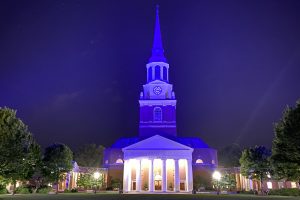Cooperative Baptist Fellowship (CBF), young adults, “contemporary” worship, progressive theology, and “nice” Christians—let’s talk about it. To begin, I guess you, as the reader, should know I’m a 27-year-old, white male in full time ministry, and some of my closest friends work in CBF churches, so I’m not out to bash CBF. However, I can’t help but notice that there are very few churches within the CBF denomi-network that are effectively reaching young adults, and there are even fewer with “contemporary” worship services. And yes, that’s right, I just connected young adults to “contemporary” worship. Don’t worry, connecting the two is only a starting place, so breathe deeply and hang in there with me.
A couple of weeks ago I was visiting some family and went to a non-denominational (pseudo-SBC) church in NC. It was your typical mega-church—things kicked off with three or four songs led by a hip worship band, followed by a 45-minute sermon, prayer, one slow song, one fast song, and then a closing prayer. Personally, I’m more of a “smells and bells” kind of guy. But I was blown away by the number of young adults in attendance—there were hundreds of people my age, and it got me thinking. Because you see, I affiliate with CBF, but I’ve never been to a CBF church with hundreds of young adults. To be completely honest, I’ve never been to a CBF church with more than 25 young adults. And I can’t help but wonder if it’s because the majority of CBF churches have bought hook, line, and sinker into a singular style of worship called “traditional” worship. Now before you start pushing back, take a moment and entertain the following question: are CBF churches, by and large, scared of “contemporary” worship?
You might be thinking to yourself, CBF churches aren’t scared of “contemporary” worship. But let’s be honest, those churches that have started “contemporary” services and still have one are an anomaly. More often than not, the story goes like this. The pastor, or another staff member, starts a new service, one that is not “traditional;” people start coming; it grows; young adults actually show up; and then the church at large freaks out, and they either kill the service or push out the pastor who suggested such a heinous idea. And anytime this happens, it is terribly sad for people like me to watch. Because why would you kill something that has life?
So I went to Facebook, and sent out a few text messages, and made a few calls—I wanted to figure out if there is in fact an aversion to “contemporary” worship within CBF, and if so, why? Here’s what I discovered.
There appear to be three types of churches effectively reaching and retaining young adults (beware of sweeping generalizations—this is meant to start a conversation and could definitely be more nuanced).
- Young adults go to churches with a “contemporary” worship style that espouse a conservative theology. The life of the church is built around the propagation of certainty, and the primary message is that of sin and salvation, evidenced by their concern for reaching those who are not “saved” with the message of Jesus Christ.
- Young adults go to churches with a “high church/liturgical” worship style that espouse a progressive theology. The life of the church is built around exploration/questions/doubt, as well as social action (advocating for the poor, outcast, marginalized, etc).
- Young adults go to First Baptist-type churches with large budgets that have a dedicated space for young adults, well-funded programming, sometimes an additional service, and more often than not, a full-time minister of young adults and/or associate pastor.
Church one and two are by far the most successful, and interestingly, I think their success is a result of their message, more than anything else. To put it bluntly, they actually give young adults something to do. Church three is somewhat successful, but its focus is less on the message, and more on the medium. In other words, church three invests a lot of time and money into entertaining young adults and giving them something to consume, namely a religious experience.
Pardon me for dismissing church three at this point, but I’m more interested in church one and two, because they are doing something moderate churches struggle to do—they are communicating a clear message that both implicates and demands something of us and from us.
When it comes to church one, the message is this: go out into the world and share the gospel, reach the unreached, and get as many people saved as possible. As it is understood and communicated by most, I think this is a diminished vision, simply because it so often divulges into a form of escapism rather than inviting people into a deeper engagement with the world we live in. But it’s a vision nonetheless, and it’s something people can give their time, energy, and gifts to.
When it comes to church two, the message is this: go share the gospel, follow Jesus to the margins, embrace the “other,” seek Christ out in the face of your neighbor, and invite them into Christian community in order that they might experience the love and acceptance of Jesus Christ. Undoubtedly, becoming church two requires a major paradigm shift in the life of most congregations, especially those in Baptist life. Though churches in category two are very different from those churches in the first category, they do, however, share something in common—both church one and two expect something of those who show up.
So what does all of this have to do with “contemporary” worship? Well, when it comes to young adults participation in congregational life, not much at all. Worship style doesn’t really appear to be the primary factor when it comes to reaching and retaining young adults, but instead, I think it’s that which exists behind the worship style—a clear message. And yet I don’t want to move on too quickly, because the worship style is a medium meant to serve the message, and I can’t help but wonder if CBF’s apparent aversion to “contemporary” worship is hampering CBF’s ability to engage young adults, and even median adults. And here’s why I say that.
First off, let me clarify the difference between the message and the medium. There is the message, that which is said, and then there is the method, the vehicle by which that message is delivered. And that’s the medium. And the medium includes everything from the sermon style to the worship space, to the people, to the practices (liturgy), to the graphics, to the use of technology—really, the medium is just about everything that sits in the worship space or takes place during the worship hour. And whether we consciously recognize it or not, the medium is at all times communicating a message. So the question is this: is the medium communicating the message we want it to or think it is?
In too many cases the medium does little more than muddle the message, and sometimes it even misappropriates it. For example, Passion City Church (a youthful, mega-church in Atlanta, GA) will have a harder time convincing people to care for the poor than Park Avenue Baptist Church (an interracial, urban congregation in Atlanta, GA) will simply because their medium betrays their message. So, though I’m as convinced as ever that the primary driver of church growth, particularly as it relates to young adults, is the message, we must also consider the medium.
Truth be told, it’s hard to be progressive in a “traditional” worship service, simply because the medium does not easily lend itself to the message. A message of inclusion and diversity is best heard when supported by a medium that matches it, one that actually includes diversity—a diversity of people (both in the crowd and behind the pulpit), a diversity of ideas, a diversity of music and music styles, a diversity of readings, responses, prayers, and graphics.
So is it possible? Is it possible to create a service that is progressive through and through, but includes hymns, as well as secular music, “contemporary” music, and who knows, maybe even a Gregorian chant? Could we do prayer stations? Why not? How about a moment of silence, the reading of a poem, litany of confession, etc.? What if we wrote our own music? Do we have to plug and chug songs every week? Is it possible to play one song with the organ, and the next with a guitar? Is this a sin against God, or a real possibility for your congregation? And with that last question in mind, how many young adults do you have participating in the life of your church?
So let’s return to an earlier point and bring this thing home. As much as we’d like to make it about the worship style, I think we simply need to look a little deeper. What’s the message? Or to say it another way, what sits behind the medium? What is the narrative being told? What is the why? Young people want to know. What is your congregation doing? Where are you going? Who are you becoming?
The medium matters, but if you’re like church three, and all you’re doing is managing a bunch of small changes and throwing money at young people in the form of snazzy programming, well then, you’re taking a huge gamble, and you risk running in place.
So the haunting question for all of us is this: Is it possible we’ve botched the message of Jesus Christ and made Christianity too easy?
According to Kendra Creasy Dean in Almost Christian, the answer is a resounding…Yes! In pursuit of “personal happiness and inter-personal niceness,” following Jesus is no longer dangerous; it doesn’t require anything of us, except some semblance of morality; and we have somehow justified excessive monetary blessing (privilege) as a symbol of God’s reward to us for our obedience. In the end, what this means is there are a bunch of us who are “almost Christian.”
It follows then that churches struggling to effectively reaching young people are, at the same time, the churches that have fallen into traditional church-culture patterns, which are primarily concerned with creating “good” people that show up for worship on a semi-regular basis and believe all the right things. This way of holding or practicing faith is what Kendra Creasy Dean calls “Moralistic Therapeutic Deism.”
According to Dean,
“Moralistic Therapeutic Deism has little to do with God or a sense of a divine mission in the world. It offers comfort, bolsters self-esteem, helps solve a few problems, and lubricates interpersonal relationships by encouraging people to do good, feel good, and keep God at arm’s length.” As a result, “Churches have lost track of Christianity’s missional imagination…Jesus doesn’t tinker; he tears down walls, draws up new plans, (and) makes demands.”
I don’t mean to state it so harshly, but between conservative and liberal seems to sit “nice.” And “nice” looks a lot like apathy to those hard at work. Being that change is written into every moment, you’re either regressing or progressing. And no one can really know for sure which direction “nice” is going. Is “nice” going up or down, becoming or unbecoming? Which direction is your congregation moving? If you’re trying to be “nice,” it’s likely you have no real idea.
When it comes to faith development, there is in fact a starting place, but there are also subsequent stages. As Christian ministers, it’s our responsibility to meet people where they’re at and invite them to take the next step. As long as our church is happy with where things are at, as long as they are fine with just being a bunch of “nice” Christians, things will remain as they are. And until pastors encourage them to move, every church’s center of gravity will remain where it is.
It’s sounds a bit crazy when you first hear it, but perhaps what young adults are really looking for is a church where people are less interested in being “nice,” and more interested in being faithful to Jesus Christ’s call on us in this time and place, both individually and collectively.
It’s not enough for church leaders to plug and chug songs into the worship order every week. And it’s not enough to waste all of one’s creative energy massaging and managing church members’ emotions all day, every day. The church is in need desperate need of courageous and creative leaders prepared to say what is needed, to invite people into complexity and paradox, and ultimately, to help them figure out what it looks like to participate with God in God’s work, here and now.
With your congregation in mind, I invite you to carefully reflect on the following questions: Do we practice the kind of faith we want our young adults to have? What does faith look like for the average person in our congregation? Where are we going? What are we doing (outside the worship hour)? Being that we live in a sea of choices, what is about who we are and what we do that is worth committing to?
In the end, if we don’t make room for young adults it’s probably because we don’t want to change, which is the same as saying we don’t want to grow. It appears there are a number of churches scared to death of being anything other than what they are or doing anything other than what they do. What if our fear, however, is keeping us from becoming what God created us to be? Are we forgetting (neglecting) to take Jesus seriously? I think young adults, merely by their presence and sometimes with their insistence, remind us of these things, so in a thousand small ways churches push them out, laugh at them for their idealism, and tell them to come back when they’ve grown up a bit, i.e. when they have kids. And when we do this, we lose something vitally important—passionate young adults.
So, what about “contemporary” worship? Ah, take it or leave it—it’s merely a preference. But don’t neglect the more that is going on behind your worship, because the more, which is the message, always shines through. Are people hearing what you want them to hear? Are they following Jesus more closely as a result of their time worshipping with and among those who have gathered?
According to Scripture, God is at work reconciling and renewing all of creation, which means there’s a lot of work to do. That’s the real message. Sure, the medium matters, but even young adults will show up and sing hymns every week if they’re captivated by the message.






































































